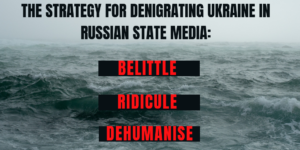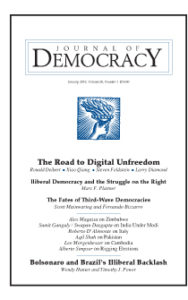Deepfakes threaten to erode democracy in The Coming Age of Post-Truth Geopolitics, say analysts Robert Chesney and Danielle Citron. The problem is not just that deepfakes can be used to stoke social and ideological divisions. They can create a “liar’s dividend”: as people become more aware of the existence of deepfakes, public figures caught in genuine recordings of misbehavior will find it easier to cast doubt on the evidence against them, they write for Foreign Affairs:
More broadly, as the public becomes sensitized to the threat of deepfakes, it may become less inclined to trust news in general. And journalists, for their part, may become more wary about relying on, let alone publishing, audio or video of fast-breaking events for fear that the evidence will turn out to have been faked. Deepfakes will be particularly useful to nonstate actors, such as insurgent groups and terrorist organizations, which have historically lacked the resources to make and disseminate fraudulent yet credible audio or video content. …

Credit: eu vs disinfo
A recent Alliance for Securing Democracy forum on How to Stop Technology from Damaging Democracy (above), features Shanthi Kalathil, the NED’s Senior Director of the International Forum for Democratic Studies.
Closing off the spaces for rational inquiry will only deepen the social vertigo and prevent the course corrections needed to regain our individual and social balance, argues analyst Bret Swanson. Despite all the real technological solutions to the challenge of information overload, human leadership and loftier social expectations may prove most important. To regain our balance, we desperately need our powers of science and civic discussion.
 The growing threat of digital repression is a focus of The Journal of Democracy’s January 2019 issue—available free of charge through 15 February 2019 on Project Muse:
The growing threat of digital repression is a focus of The Journal of Democracy’s January 2019 issue—available free of charge through 15 February 2019 on Project Muse:
- An overview essay by Larry Diamond outlines the ways in which new technologies are threatening to undermine democracy, and even to foster “postmodern totalitarianism”;
- Ronald J. Deibert explores the “personal-data surveillance economy” underlying social media;
- Steven Feldstein highlights the dangers posed by the proliferation and abuse of artificial intelligence;
- Xiao Qiang explains how Chinese authorities are harnessing advanced digital technologies to build a comprehensive system of monitoring and control.
In the meantime, democratic societies will have to learn resilience, analysts Chesney and Citron add:
On the one hand, this will mean accepting that audio and video content cannot be taken at face value; on the other, it will mean fighting the descent into a post-truth world, in which citizens retreat to their private information bubbles and regard as fact only that which flatters their own beliefs. In short, democracies will have to accept an uncomfortable truth: in order to survive the threat of deepfakes, they are going to have to learn how to live with lies.







